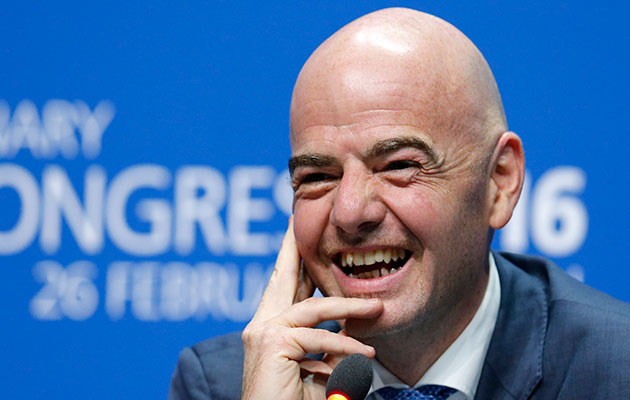New president Gianni Infantino has hailed a ‘wind of change’ blowing through FIFA as evidenced by a major new sponsor deal with China’s Wanda Group.
FIFA’s accounts dropped into the red last year for the first time in 13 years as a result of the weight of scandals which threatened to sink the world football federation. Three sponsors stepped away from the World Cup while a stream of corruption revelations intimidated others from stepping into the breach.
Three weeks ago, however, FIFA Congress voted in both a major reform programme as well as Infantino in place of banned and disgraced Sepp Blatter with the ambition of rebuilding both the organisation’s battered image but also its finances.
Infantino emerged from having chaired his first meeting of the executive committee bubbling over with optimism and enthusiasm about the journey whose path appears a little more secure after he shook hands on a four-World Cup, 12-year deal with Wanda chairman Wang Jianlin.
Summing up his three weeks in office and his first sponsorship coup, Infantino said: “The wind has changed. I am very pleased and proud that I can today announce a new sponsor, a new partner for FIFA from China in the Wanda Group.
“I’m looking forward to this partnership because it is an important strategic partner for the future, being a company from China which is a very important country. It is an important contract and makes me very happy.
“It’s been a great couple of weeks.”
Blatter legacy still visible
However, the awful legacy of FIFA’s past cannot be shrugged off easily. Wanda’s head of sports business is Philippe Blatter, nephew of the ousted former FIFA president.
He joined Wanda when it bought up Infront, the Zug-based group which had worked closely with FIFA on broadcast and commercial deals and which has a stake in one of the Byrom companies which have worked FIFA on World Cup hospitality.
Acknowledging the long shadow of recent history, Infantino said: “I am very well aware of the potential situations that can exist when you have partners who may have subsidiaries with other commercial relationships.
“It’s especially important in these circumstances to do the right thing and make sure the contracts are checked and compliant with the highest standard.
“FIFA has undergone a process that makes it now almost over-sensitive to these elements and makes sure all these compliance requirements are fulfilled.”
Wanda might be the first new deal but it would certainly not be the last.
Infantino added: “The reform package and new presidency have changed a lot of things. The relationships with our commercial partners is one of my key priorities and I will go to see them all in person and restore their trust in FIFA.
“By doing this we will also attract new sponsors and there will be some more positive news to announce in the coming weeks in this respect. The financial accounts of 2015 are in the past: 2016 and onwards will look very different.”
Infantino’s ‘wind of change’ will also be seen as a clear signal that the World Cup finals could be heading to China which has suddenly directed a massive focus on the game at both corporate and club level.
New World Cup bidding process
This week’s meeting of the executive committee was the last in the present form since it will evolve into the new FIFA Council ahead of congress in Mexico City in May. That meeting, Infantino indicated, would start to consider the bidding process for the 2026 World Cup.
Since Asia, with Qatar, plays host in 2022, the Chinese can forget about 2026. But if bidding is thrown open, with no other rotation restraints, then it might target 2030 and the centenary of the World Cup itself.
That would be the last World Cup of the new Wanda deal.
Infantino said: “China is a football country and an economic powerhouse and the investments that the government and football federation are making now will bring some important fruits in terms of development.
“Of course the whole world would like to organise the World Cup. We will look at the bidding process for 2026 and onwards but the more countries who can bid the better it is. We need to analyse the whole situation; there are other great football events that maybe China can host in the future.
On one point Infantino remained firm about future World Cups: he wants to see the expansion to 40 teams which was one of the headline points of his presidential campagn manifesto. This did not go down well with the European Club Association which represents the continental elite.
He said: “I think [a 40-team World Cup] is beneficial from a sporting, a promotional and a commercial point of view.
“I am not a dictator so I will try to convince everyone – including the ECA – of the merit of my arguments. In my time as UEFA half of my time was sent discussing with clubs, arguing with clubs, debating with clubs and agreeing with clubs.
“We need to make everyone happy . . . and then FIFA has to take its own responsibility and make the right decision for football.”







